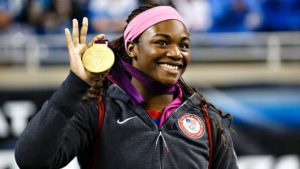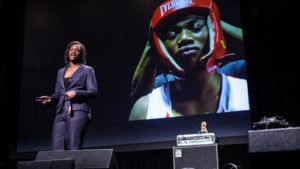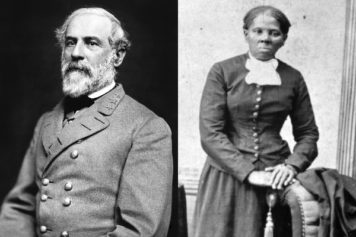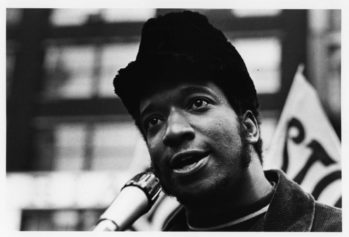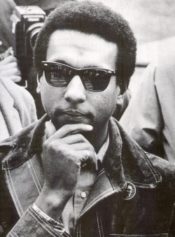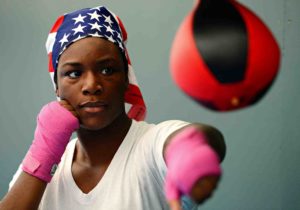
Standing on the medal platform as champion in London was another, improbable world from where Shields came—literally and figuratively. But there she was, a teenager considered the best in the world at what she does. This came after an upbringing so harsh that she did not speak her first words until she was five—and she stuttered badly then.
Well, that once reticent child has a lot to say now—eloquently, too—about surviving poverty and sexual abuse in one of the most dangerous cities in the country, about being a “Black activist” and adopting a child at 19.
Yes, hers is a story and personality Americans can embrace, once they learn more about her. But Shields, for reasons she cannot identify, did not become an American hero with her London feat. Maybe her relative obscurity will be lifted a bit with the viewing of the new documentary, “T-Rex,” which explores her odyssey to Olympic exaltation and her challenged life growing up in Flint, Michigan.
“I was an angry child,” Shields said to Al-Jazeera. “[But] at 13, I got baptized and started going to church and it changed from there. I started boxing. Before I started boxing, I was in a real dark place. I would sit in my room and—I didn’t have a bed, I had a couch—I leaned it up against the door. No one came to my room. My mom said, ‘Something is wrong with her. She doesn’t talk to anyone.’”
She said her faith carried her through her early childhood, even as her mother’s “boyfriends” sexually abused her when her mom was not around.
“My mom, yeah, she took care of us, but I was pretty angry,” Shields said to Yahoo! Sports. “We never used to have enough food in the house. She always had men over. All men aren’t bad men, but it was like, these guys who were her friends were like perverts and molesters. I had to deal with that for a long time. Whenever she got a new boyfriend and had a new friend come over, it got to the point where they’d start to touch and feel on me.
“I go to the point where I would lash out and I would tell on them. I told my Mom, but she never, ever used to believe me.”
At 11, her father, who was in and out of prison, told her about Muhammad Ali and his daughter, Laila, who was a boxer. That got Shields into the gym, where she could take out her anger on a punching bag or, better yet, actual opponents.
She said she eventually moved in with her grandmother, who believed Shields’ stories of men sexually abusing her. But she died not long after Shields arrived. Her boxing coach, Jason Crutchfield, assumed the role of raising her.
“I was probably 14 or 15 when my coach took me in,” she said. “He basically did whatever a father had to do: He fed me, got me up to go running, took me back and forth to school and the gym. That’s how we started chasing our dreams to the Olympics.”
And, in a testament to the strength and power that so many Black women have shown through the ages, Shields accomplished her dream. She’s 52-1 in her career and hopes to defend her gold medal in the 2016 Olympics in Rio de Janeiro.
And she will do so as a mother. A cousin already with two children was planning to abort a third child. Shields convinced her to have the baby and let Shields raise it. The cousin agreed, and so 19-year-old Shields is mother to nine-month-old Klaressa.
“I really wanted a baby myself and I wanted to have one when I turned 18 right after I won the Olympics [in 2012],” she said to Yahoo! Sports. “But if it would have happened, it would have messed up my body going into the 2016 Olympics. I couldn’t get pregnant because of that. So I said to her, ‘You have the baby, and I’ll adopt her.'”
All the official paperwork is not complete, but the child lives with Shields, who is solely responsible for her. And if she cannot get an adequate sitter, Shields says she stays home and shadow boxes for an hour and a half with the baby right there. And her 17-year-old brother lives with her, too.
“I’m going to give her the best of everything, and I’m going to protect her like no mother ever protected her baby. I just love having her, even though it’s a huge responsibility. It makes me slow down and think, and that’s a good thing.”
And she thinks about a lot. She was featured in an Audi commercial and could strike a deal with Under Armor, but the strike-it-rich endorsements did not come her way after London.
“At first, it was real discouraging,” she said. “Everyone said something was going to happen. Maybe a month and a half after we got back, everyone was like, ‘Gabby Douglas got this’ and ‘Gabby Douglas got that.’ I didn’t know who Gabby Douglas was. I finally found out [and] I’m like, ‘She’s a gymnast and great at doing backflips and all that good stuff.’ She’s the 41st person to win in that category, but the first African-American to do it. I was just like, ‘I’m the first person to do what I did, period, no matter what race.’ There will never be another first. I thought I deserved more, but I had to throw it in the back and keep moving forward.
“My life did get better after the Olympics, it didn’t get worse. I’m able to do some things for my family now. I’ve always had to learn how to budget. With my money, I’m like, ‘Save, save, save, and you spend this much per month, and this is your play money for this month.’ I don’t dwell on the past.”
Shields does dwell on race in American. “I’m just going to put it out there: I’m a Black activist,” she said to Al-Jazeera. “I care about my race and I care about other races. I don’t like the fact that all these Black men have to get shot down by these white cops. I just don’t appreciate that. I tell my little brother all the time to be careful. He’s 17 now, and I tell him, ‘When you get into it with the cops, you don’t talk back. You do what they say. As long as they’re not trying to do anything physical to you, just do what they say.’
“I’ve gotten pulled over at least twice. They’ve been nice to me and I’ve been nice to them. Some cops don’t know who I am. In Flint, I get pulled over and the cops feel bad pulling me over. ‘That’s our golden girl, we’re not going to arrest her.’ And actually, a lot of cops know me from when I lived with my mom, as they were coming to our house so much.”
Her mother and father have improved their lives, she said, and their relationships have been stronger over the last few years “Traveling all the time . . . gave me (a) broader view. But sometimes, when you’re in that dark place like Flint, you’re around so much negativity and you can’t see the bigger picture,” Shields said. “I’m a Black activist and I just try to inspire kids to do better and actually want to live a great life…If you’re a girl and you’re having a bad day and it seems like it’s never going to get better, think of me. Look what I’ve done. Look what I overcame. I did it. I dreamed about reaching a goal and I made it happen. You can, too. I’m living proof of that.”
